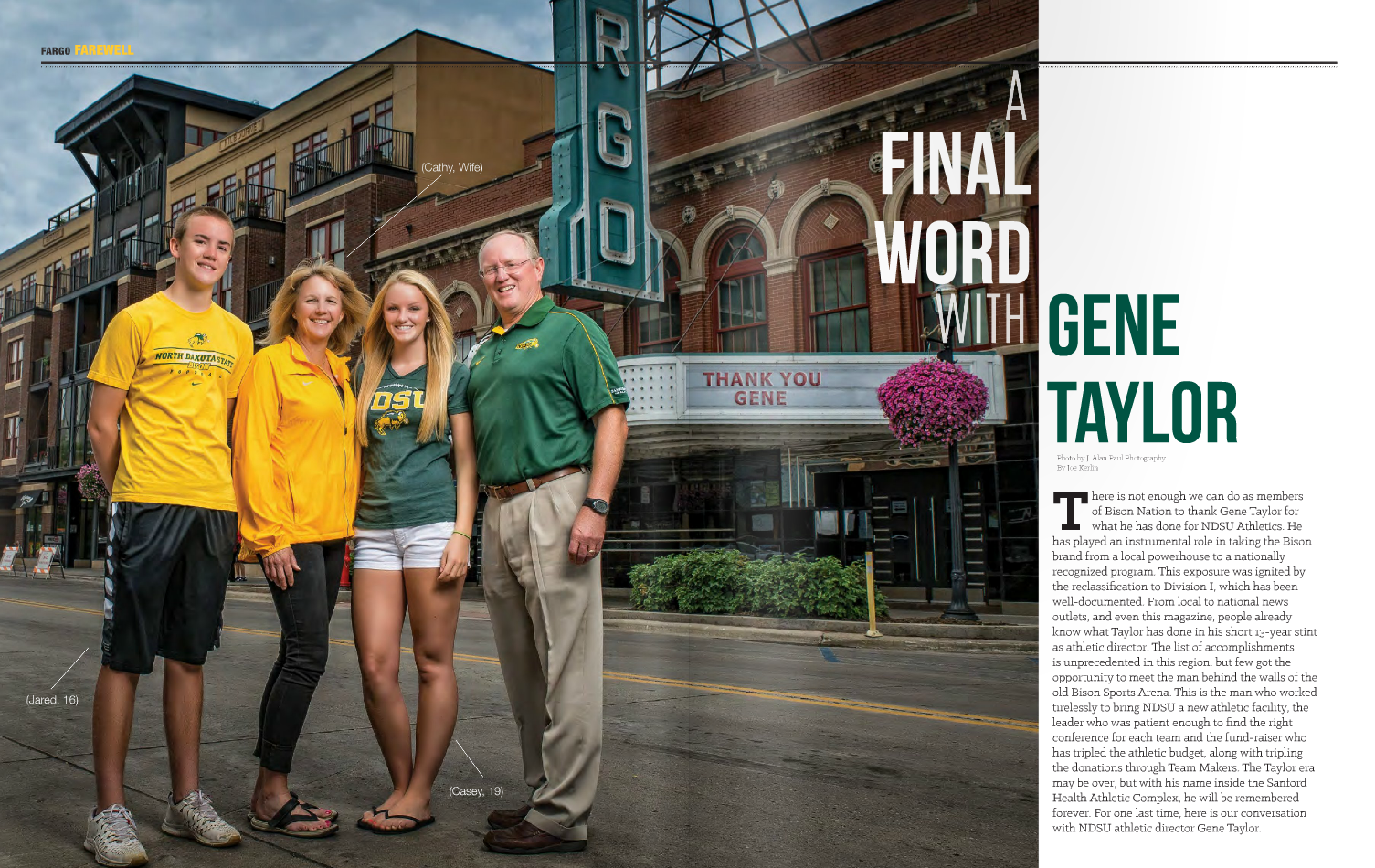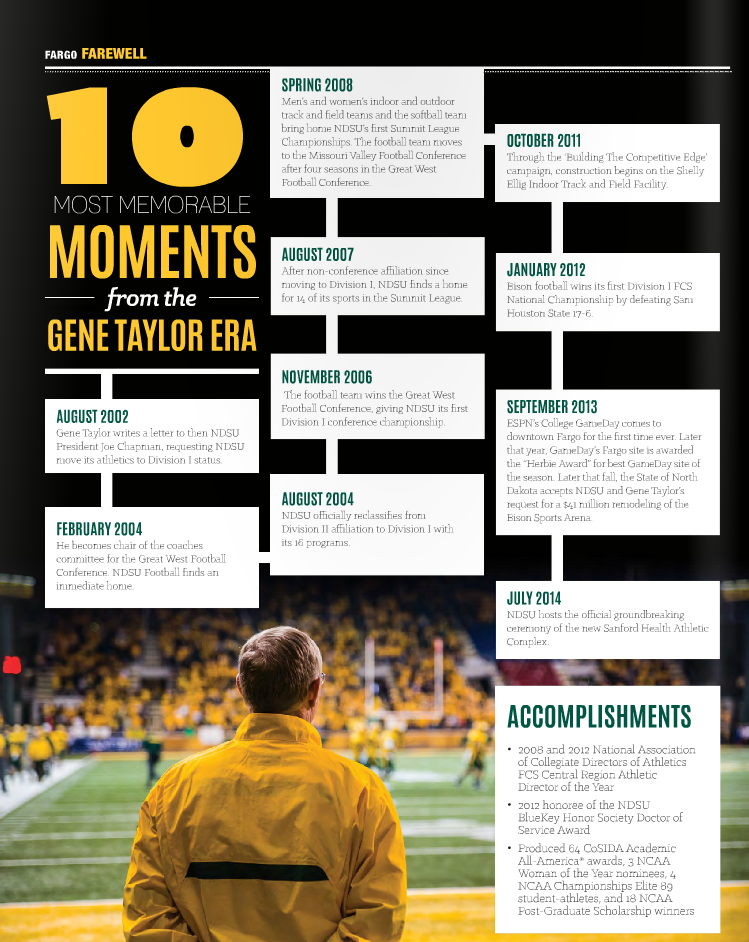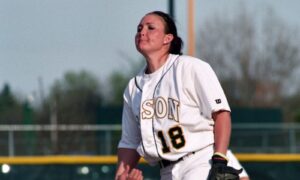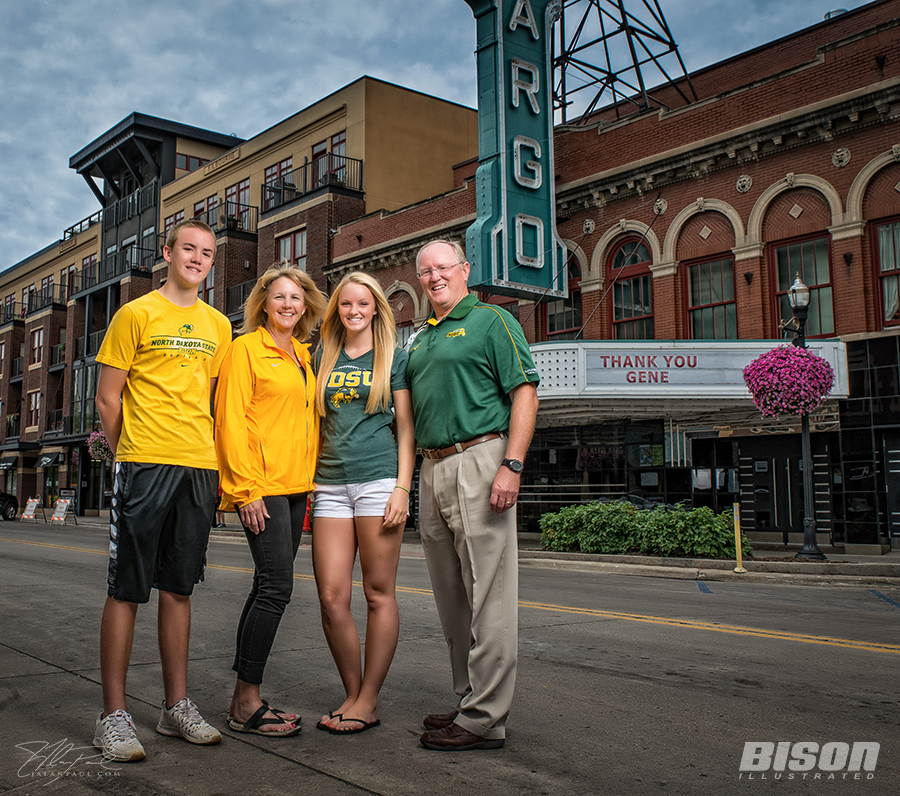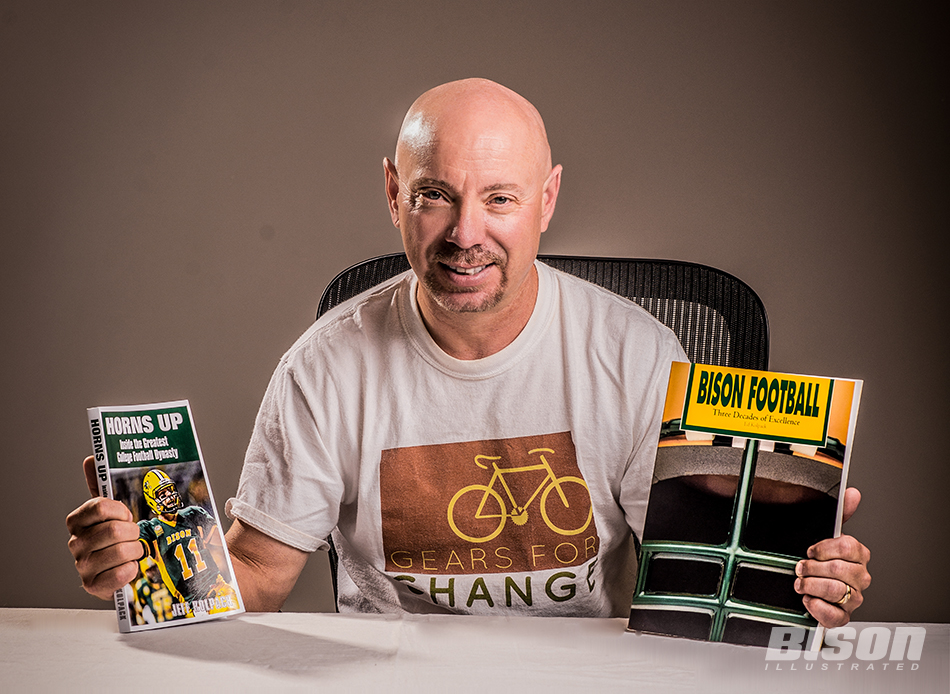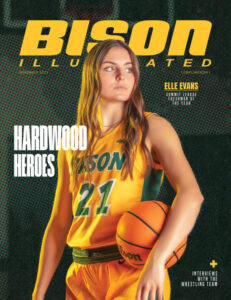Bison Illustrated: What did you know about NDSU Athletics before taking over as the athletic director?
Gene Taylor: “They operated at a high end. Their success is well-documented with national championships. So when I came in, and that was one of the charges with President Chapman, I knew it was going to be a lot easier than what everyone thought because the support mechanisms were already at a high-level, above any other Division II program. I think that was one of the reasons (we) had so much success and so much early success because we didn’t have to start from scratch. There were a lot of things already in place at the Division I level.”
Was it a no-brainer for you to write that letter suggesting NDSU go to DI?
“It was, but I knew there was a lot of work to be done to get there. There were so many people that were so comfortable at Division II and saw it as a major change and saw us not having success. I mean, I didn’t know we were going to have the success that we’ve had. I knew we would have success, but no one could have ever scripted this. I knew there were support systems in place so that success would come along a lot quicker than other places that had made that transition.”
Looking back at it then, you came into a pretty good situation, would you say?
“Oh absolutely. NDSU was in a good place when I got here and obviously there were some challenges.”
What were some of those challenges?
“They had to change the leadership, obviously. It was about a six-month period where they didn’t know who their athletic director was going to be and the biggest question was: are we adding hockey or are we going Division I? The longtime staff at the time, a very good staff, knew there were going to be some changes and a new guy was going to come in and they didn’t know what the new guy was going to do. ‘Is he going to include us?’ But they were great. … They knew there were some major changes, in some shape or form, were going to happen. The challenge I guess was just the challenge of the unknown. But in terms of the structure and the quality of the people here, I didn’t have to come in and make sweeping changes and I didn’t want to, because the people that were really good and a lot of them are still here. Over time obviously, Amy (Ruley) retired and Bucky (Maughan) retired, but those are the changes that happen over time. There were a lot of people that were very solid when I got here. That made my job a lot easier than people probably realize.”
How much unknown will there be for the new AD?
“I think in a different way there’s always going to be question about what he or she will be like, who are they going to bring in. The question will be how do you maintain it and how do you keep it moving? How do you keep at the top level, knowing you hope you have years like this? And I think that they will. There are teams here that will continue to win conference tournaments and make the NCAA Tournament. The football team will always be in the hunt for the national championship. With the coaches in place, I don’t have any concern that they’re not going to have success. Dave Richman said it best: ‘We were good before we got here, and they’ll continue to be good after Gene has left. We’re always going to be good.’ The new AD will be coming down the same hall with the same quality of people that I got a chance to walk into that are here now. So the new AD is going to come in here and say, ‘Wow, this is a pretty good deal.’ And if they don’t, I’d be pretty surprised. There are talented people up and down this hallway.”
How has your time at NDSU helped shape you professionally?
“Probably, — well maybe my staff won’t agree with this — (laughs) my patience. I was not a really patient person, and I think I became more patient here. … If you work hard enough and you have people that believe in what you’re doing, things will work out for the best … One of them was the conference affiliation; we had some ups and downs there. But we knew who we were as an institution, we knew who we were as a program and we knew eventually we were going to see North Dakota State in the bid, but that’s where the patience came in with me because it didn’t happen in one or two years. It took three or four years.
What has Fargo meant to your family?
“My kids growing up, this is home. This is absolutely home for them. My daughter is going to graduate from NDSU, as much as she thought she was going someplace else, she is going to be involved in this program. Jared, in his mind, if he is good enough one day, he’d love to come back and be a Bison. This is home for them. Just like Cathy’s home was Pittsburgh and my home was Arizona. Casey has been out on the East Coast this summer and she said, ‘Dad, now I know why I really like Fargo. It’s different.’ For Cathy to have the dear, dear friends she has coming out of with. It’s easy for me, you know, it’s like you’re an athlete and you have those friends. For me, I had work friends. Cathy was beside herself and it took awhile, but now has dear friends here in Fargo and most likely even stronger friends than she’s had in Annapolis.”
So it sounds like the group of people in this building have created a sense of family.
“You go up and down this hallway and there are guys that were single when I got here that now they have gotten married and had kids. It’s a collective family. There are a lot of guys that collectively hang out here. I don’t go out so much being their boss (laughs), but you bet I have gone out and had a beer with them from time to time. The bond is nice. It’s not unusual to go to a birthday party because it’s a pretty tight-knit group.”
Everyone knows you’re a humble guy, Gene, and you like to pass the credit to the people working here, but do you ever sit back and just enjoy what you have done here?
“Yeah, I’ll sit back and go, ‘Wow, that was pretty cool.’ Yeah, I do. It means a lot. I think that’s why it’s so hard to leave because I care so much about the people that have done the hard work. The coaches and the staff, the amount of hours they have put in. But I do look back and take a great amount of pride in what we have done and the fact I sat back in this chair and made some decisions and made some calls that were questioned at the time and written about, positively and negatively, but you go out and do it. You’re not a normal person if you don’t take pride in doing that. I can’t take full credit because there’s too many things that go into (it) and too many people that worked hard that really deserve it. I told my staff this: ‘You guys, we need to collectively enjoy this.’ For the last five or six years, once we got through the transition years, the experiences they have all had, whether it’s the championships or the basketball tournaments or whatever, there’s a lot of my colleagues that have been in this business for 20-some years that have never had runs like this. Collectively, if you’re a young administrator or you’re coming towards the end of your career, this is the time to embrace it and enjoy it and to feel good about it. I hope they all feel as good as I do.”
What are you going to be most proud of looking back at your career at NDSU?
“I think just the collective move through a very challenging Division I transition; I hope it’s not an unprecedented success. They have had many years of success from the time I have left and I think they will. The coaches have done that to make that happen. Just looking back and say, ‘There were many naysayers who didn’t think we were going to have success.’ Saying, ‘Never going to do it. This is the dumbest decision you have ever made.’ I can look back and say we, we collectively, proved a whole bunch of people wrong along the way. Not just our fans, because our fans helped us get there, but across the country. I have had conference commissioners say, ‘Why are you doing this? You have had success at Division II; you won’t at Division I. I won’t let you in our conference.’ There were a lot of people like that.”
You stuck it to ‘em.
“At the end of the day, that’s what I go back to think. Our fanbase, some of them were naysayers, but some of them were more public than others and some of them were private, but when they realized ‘Hey, this is our team,’ they got behind them in a big way. I mean Team Makers going from 700,000 to 3 million (dollars), you name it. The dollars have gone up. People have said we better get on this train and enjoy this ride, and many, many people have. They can take as much pride in this as we have.”
Are there any final words you’d like to say to Fargo and the entire Bison Nation?
“What our community and our fanbase have done for me personally and professionally is something I’ll never be able to thank them enough for. I just want to send out a big thank you and if I could hug every one of them I would, because they have been such a big part of the success. You know, sometimes I get way more credit than I deserve, but it’s really the people up and down the hallway, the student-athletes and the fans that finally got behind it. I will never be able to thank them enough for the experience I had here. My deep love and appreciation for Bison Athletics will never change, never change.”


